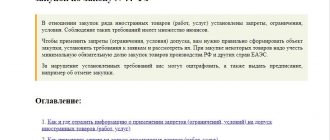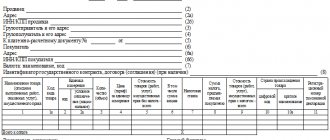The Federal Tax Service maintains a register of small and medium-sized businesses. It includes organizations and individual entrepreneurs that meet certain requirements - among other things, the number of employees and annual income. Such companies receive certain benefits, for example, targeted subsidies and the right to participate in special procurement by government customers.
In 2022, small businesses additionally received “coronavirus” support from the state - reduced insurance rates, deferred reporting, and others. For some SMEs, funds were allocated for employee payments, and tax payments were cancelled. To count on all this, you must appear in the official register. And before asking for support, it is advisable to check your affiliation with SMEs.
Free tax consultation
Who are SMEs?
The phrase “SMEs” stands for “Small and Medium Enterprises”.
These include medium, small and micro enterprises. Also in practice, another abbreviation is used to designate this category of persons - SMP. It stands for “Small Business Entities”. In what follows, we will use these terms as synonyms. Check whether your organization/individual entrepreneur is a small or medium-sized business
Important
All small and medium-sized businesses must be included in a special register maintained by the Federal Tax Service. This register is publicly available on the tax service website at https://rmsp.nalog.ru.
How to check a member
If the supplier participates in the procedure with benefits under Art. 30 44-FZ, he is obliged to provide a declaration of membership in SMEs. In electronic procedures, such a declaration is generated automatically during the application process. And in paper tenders, ownership is confirmed by a declaration or an extract from a single list.
From August 1, 2016, the customer has the opportunity to verify that the participant is one of the SMP. To do this, he receives an extract from the SMP register using the TIN. If the data is missing, then the participant is not such a legal entity. And if he declared that he belongs to a small business, his application should be rejected because it contains false information.
Small business criteria 2022: table
The main criteria for SMP are given in the Federal Law of July 24, 2007 No. 209-FZ “On the development of small and medium-sized businesses in the Russian Federation” (hereinafter referred to as Law No. 209-FZ). According to the article of this law, they can be both individual entrepreneurs and organizations - LLCs, cooperatives, peasant (farm) enterprises.
The table shows the performance indicators upon which the taxpayer becomes a small and medium-sized enterprise.
| Category | Average headcount for the previous year | Income for the previous year excluding VAT according to tax records | Other restrictions |
| Microenterprise | no more than 15 people | no more than 120 million rubles. |
|
| Small business | no more than 100 people | no more than 800 million rubles. | |
| Medium enterprise | no more than 250 people (for certain types of activities - up to 1500 people) | no more than 2 billion rubles. |
The share of participation indicators common to all small and medium-sized businesses are determined annually. Violation of them immediately leads to the loss of the corresponding status.
Income and average headcount restrictions apply cumulatively over three years. This means that a change in the category of a SME entity or loss of status occurs only if at least one of these criteria is not met for three years in a row (clause 4 of article Law No. 209-FZ, clause 1 of the letter of the Federal Tax Service dated 18.08 .16 No. 14-2-04/ [email protected] , letter from the Ministry of Economic Development dated 04/11/16 No. D28i-913).
For example, a company or individual entrepreneur will lose its SMP status (will move to another category) from 2022 if during each of the three previous years (2019, 2022 and 2022) the income and (or) number of employees indicators were exceeded. If both parameters were met in at least one of the listed years, then the status in 2022 is maintained.
Find out OKVED, taxation system and income of your counterparty
What does the status of a small business entity provide?
Including an organization or individual entrepreneur in the register of small businesses makes it possible to enjoy various benefits and government support measures. These privileges are established at the federal, regional and local levels.
Moreover, we are talking not only about tax benefits. The list of preferences that small businesses are entitled to is much broader. These include benefits when submitting reports and maintaining accounting records, additional protection of funds in accounts, etc.
Benefits for small businesses
Let's consider the main concessions and benefits that are provided to small and medium-sized businesses.
Accounting and reporting
A significant part of the benefits relates to accounting. Thus, almost all small enterprises (except for those that are subject to mandatory audit, microfinance organizations, housing cooperatives and other entities named in paragraph 5 of Article 6 of the Federal Law of December 6, 2011 No. 402-FZ on accounting) can conduct simplified accounting and submit simplified financial statements. In most cases, it consists of only two forms (balance sheet and income statement). Some organizations (NPOs and recipients of budget funds) must also fill out a report on the intended use of funds.
When maintaining simplified accounting, a number of concessions are provided (information of the Ministry of Finance No. PZ-3/2015). Let's list the most important ones. So, you don’t have to create a reserve for vacation pay; correct any errors in accounting as insignificant, even if they are identified after approval of the statements; do not apply PBU 18/02 “Accounting for corporate income tax calculations” and PBU 2/2008 “Accounting for construction contracts”; not to revalue fixed assets and intangible assets and not to reflect the impairment of intangible assets; do not revaluate financial investments and do not check them for impairment. Also, with this accounting method, you can take into account interest on any loans, including those received for the purchase of investment assets, as other expenses, and inventories can be assessed at the reporting date at actual cost.
Also see “Accounting policies of the organization: samples for 2022, how to compile, examples.”
Get a free sample accounting policy and do accounting in a web service for small LLCs and individual entrepreneurs
Important
The head of the organization can conduct simplified accounting directly. To do this, he needs to issue an appropriate order (Clause 3 of Art. Law No. 402-FZ on Accounting).
In addition, a small enterprise may decide to use the cash method for accounting purposes (clause 20 of the Standard Recommendations for organizing accounting for small businesses, approved by Order of the Ministry of Finance dated December 21, 1998 No. 64n).
Reference
Individual entrepreneurs, in principle, are not required to keep accounting records and prepare financial statements, even in a simplified form (subclause 1, clause 2, article 2 of Law No. 402-FZ on accounting).
Cash transactions
Directive of the Bank of Russia dated March 11, 2014 No. 3210-U established a simplified procedure for conducting cash transactions for small enterprises. It involves exempting such organizations and individual entrepreneurs from the need to approve a cash balance limit.
Based on the same instructions of the Central Bank of the Russian Federation, individual entrepreneurs have additional “cash” benefits - they do not have to issue cash receipts and expenditures and do not keep a cash book.
Also see “Cash operations: how a small company can organize cash accounting” and “Cash discipline for individual entrepreneurs: how an entrepreneur can work with cash.”
Maintain a cash book electronically for free
Tax benefits
Tax preferences for small and medium-sized enterprises are established at the regional and local levels. It is possible to introduce benefits for the payment of regional and local taxes (property tax, land and transport taxes), as well as preferential rates for income tax (in the part credited to the regional budget), a single tax within the framework of the simplified tax system.
In addition, temporary relaxations established for emergency services in connection with COVID-19 continue to apply. In particular, for payments to an employee above the minimum wage, these organizations charge insurance premiums at reduced rates, namely: for pension contributions 10%, for medical contributions - 5%, for sick leave contributions - 0%. For more information, see “Small businesses can pay premiums at a reduced rate in 2021.”
Reference
During periods of coronavirus restrictions, small and medium-sized businesses from the most affected industries could receive government subsidies (see, for example, “How can a business receive a subsidy for non-working days in November”). Additional support measures for SMP were introduced by individual regions (see, for example, “Accepting applications for the payment of a new “coronavirus” subsidy begins in Moscow”).
Labor Relations
Small businesses that employ no more than 35 (in the field of retail trade and consumer services - no more than 20) people can enter into fixed-term employment contracts with them (Article of the Labor Code of the Russian Federation). There is no need to re-register these contracts as open-ended if the employer loses its SME status, or if the specified number of employees is exceeded. In the latter case, contracts for an indefinite period should be concluded with new employees (36th (21st) and subsequent ones).
Draw up and print an employment contract
Attention!
Micro-enterprises have the right not to draw up internal labor regulations, regulations on wages, regulations on bonuses and other local regulations, as well as a shift schedule. The conditions that are usually prescribed in these documents must be included directly in the employment contract. To do this, it is better to use a special standard form of agreement (Resolution of the Government of the Russian Federation dated August 27, 2016 No. 858).
Administrative responsibility
A privilege has been established for SMEs, obliging controllers to replace almost any administrative fine with a warning.
The benefit is valid if the violation was committed for the first time and it did not cause property damage, as well as harm (or the threat of causing it) to human life and health, objects of flora and fauna, the environment, historical and cultural monuments, state security, and there was no threats of emergencies of a natural and man-made nature (clause 1 of article 4.1.1 of the Code of Administrative Offenses of the Russian Federation). The types of offenses for which it is impossible to replace a fine with a warning are listed in paragraph 2 of Article 4.1.1 of the Code of Administrative Offenses of the Russian Federation.
Deposit insurance
Accounts and deposits of micro-enterprises and small enterprises are included in the compulsory insurance system (clause 1, article 5.1 of the Federal Law of December 23, 2003 No. 177-FZ). If the bank in which the money of such a company or individual entrepreneur is located loses its license, or the Central Bank imposes a moratorium on satisfying the claims of the bank’s creditors, it will be possible to receive insurance compensation. Its size is equal to the amount that was in the accounts, but not more than 1,400,000 rubles. across all accounts in one bank. For more details, see “Money in a “problem” bank: when and how individual entrepreneurs, small businesses and individuals will be able to return money from accounts and deposits.”
Statistical reporting
For small and medium-sized businesses, the number of forms submitted to statistical authorities has been significantly reduced. In particular, they do not submit Information on underemployment and movement of workers, Information on overdue wages, Information on the volume of paid services to the population by type, and many others.
Reference
Some forms of statistical reporting are designed specifically for SMEs. For example, No. PM “Information on the main performance indicators of a small enterprise.” But SMEs do not submit form No. P˗5(m) “Basic information about the organization’s activities,” although it is a common misconception that this form is almost the main statistical report for small organizations.
Small and medium-sized businesses submit the rest of their statistical reporting in a special manner. The corresponding obligation arises within the framework of continuous (in relation to all SMP) or selective (in relation to organizations and individual entrepreneurs specified by Rosstat) statistical observation. At the same time, a comprehensive study of small businesses is carried out once every 5 years (clause 2 of Art. Law No. 209-FZ). So, in 2022, SMEs were supposed to report on their activities for 2020 (see “Continuous statistical observation of small businesses: Rosstat reminded when and how to report”).
Fill out and submit all reports to Rosstat using today’s current forms via the Internet
Selective statistical observation is carried out in relation to those entities that are included in the list determined annually by Rosstat (clause 3 of Article No. 209-FZ). Information about whether a specific entity needs to submit statistical reporting, in what forms and with what frequency can be clarified on the Rosstat website (https://websbor.gks.ru/online/info). Also see “Reporting to statistics (Rosstat) using TIN: how to find out which reports to submit.”
Government order
Companies and individual entrepreneurs that have received the status of small and medium-sized businesses can participate in government procurement under special conditions. Special tenders are held for them. The amount of security for an application for small and medium-sized enterprises is lower, and sellers - SMEs with a good reputation - may not secure the contract at all.
In addition, the payment period for a contract to which a small or medium-sized enterprise is a party is shorter than for “regular” procurement participants. The money must be paid no later than 15 working days from the date the customer signs the document on acceptance of the goods delivered (work performed, service provided) under the contract or its stage (clauses 14(3), 28 and 32(1) of the Regulations, approved by decree of the Government of the Russian Federation dated 12/11/14 No. 1352). For violating this deadline, the customer may be fined up to 100 thousand rubles. (Part 9 of Article 7.32.3 of the Code of Administrative Offenses of the Russian Federation).
Also see “Government procurement under 44-FZ: what small businesses must take into account when participating in tenders from July 2019” and “How to participate in tenders for a beginner.”
Receive notifications about tenders for small and medium businesses
Sample statement
Here's what the statement looks like in 2022:
About the author of this article
Alexandra ZadorozhnevaAccountant, project expert Practicing accountant. I have been working since the beginning of my studies at the university. I have experience in both commerce and budgeting. From 2006 to 2012 she worked as an accountant-cashier and personnel officer. From 2012 to the present - chief accountant in a budgetary institution. In addition to direct accounting, I am involved in purchasing and economic planning activities. I have been writing feature articles for specialized publications for 4 years.
Other publications by the author
- 2022.02.28 Procurement control The Ministry of Finance clarified whether to simultaneously provide benefits to organizations of people with disabilities and penal institutions
- 2022.02.28 Procurement controlInstructions for drawing up a report on purchases from SMP and SONO according to 44-FZ
- 2022.02.25 Procurement control How the Treasury authorizes transactions with funds of treasury support participants from 2022
- 2022.02.25 Customer documents Plan to change the rules for drawing up FCD plans in institutions
Features of the activities of a small enterprise
The legislation does not establish any specific features of the activities of SMEs. Accordingly, such nuances can arise only due to the use of certain benefits by the taxpayer.
For example, if a small business decides to use the cash method for accounting, then in this case the accounts receivable will not actually be reflected in the accounting. This means that you will have to monitor this parameter based on information from other sources.
In addition, you need to remember that the cash method in accounting is not at all equivalent to the cash method for the purposes of the simplified tax system. Thus, the amounts of advances received do not form accounting income, whereas under the simplified tax system they will be income at the time of receipt to the account or cash desk (clause 1 of Article 346.17 of the Tax Code of the Russian Federation). Accordingly, such discrepancies must also be taken into account so as not to underestimate the amount of tax or advance payments for it.
In conclusion, we note that all small and medium-sized businesses must periodically check the availability of information about them in a special register maintained by the Federal Tax Service. You can correct incorrect information through the form on the service website. And, of course, it is necessary to track the main criteria that give the right to be considered an SSE in 2022 - revenue, average headcount and restrictions on the composition of participants.
The register is convenient for searching for contractors and assessing their reliability
The SME register has an advanced search: you can filter potential contractors by criteria and select those who are sure to be suitable.
For example, find only Moscow micro-enterprises that are engaged in advertising and have submitted information about concluded contracts:
If the counterparty is on the register, this is a good sign. This means that the company exists and submits reports to the tax authorities.
If a small or medium-sized enterprise is not in the register, this is a reason to be wary. The organization may evade taxes or turn out to be a fly-by-night organization.
It is useful to assess the contractor’s reliability based on information from the register: average headcount, types of activities and licenses. We talked about this in the article about quick verification of counterparties.









